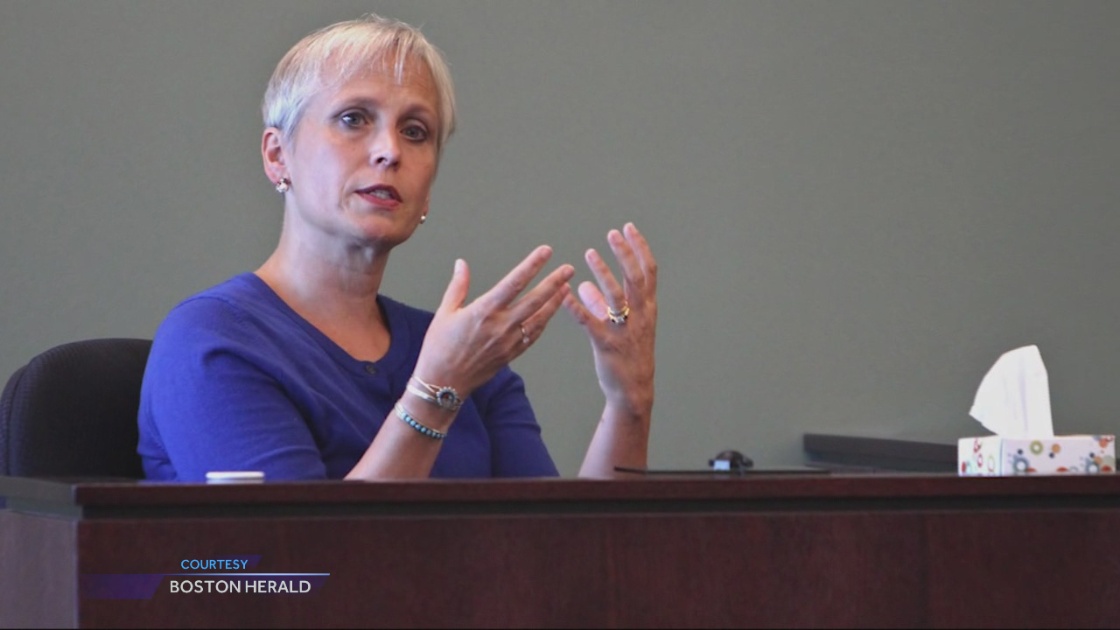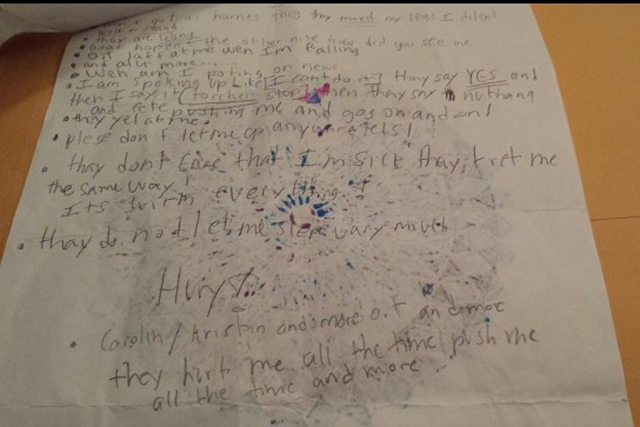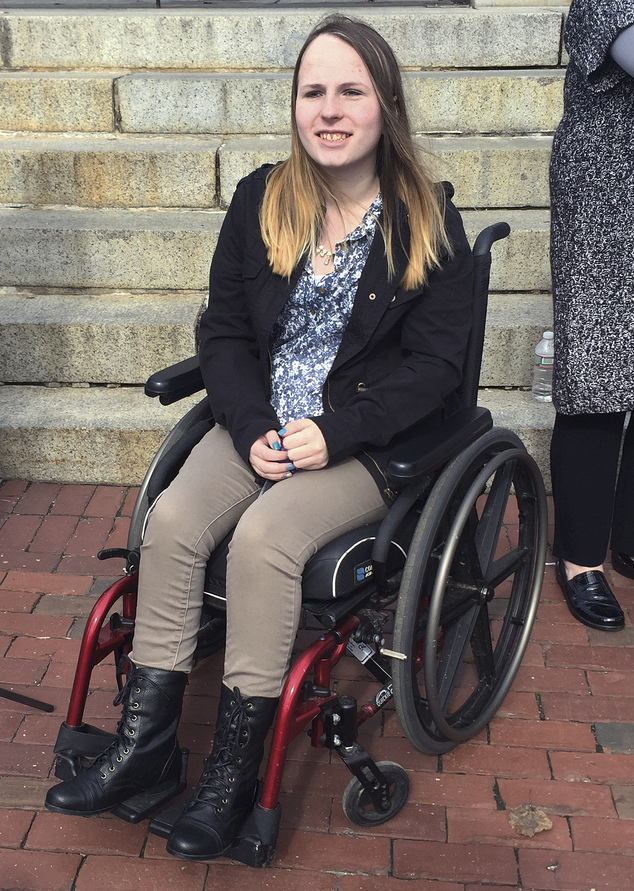Martin Gottesfeld was featured by Michelle Malkin for defending Justina Pelletier when she was maimed at Harvard-affiliated Boston Children’s Hospital (BCH), leading to his imprisonment without bail by a Harvard-affiliated judge and Obama-appointed prosecutors. For more information, see FreeMartyG.com, the FreeMartyG Facebook page, and Twitter @FreeMartyG.
Justina Pelletier arrived at the Boston Children's Hospital E.R. in February 2013, with a referral to see her gastroenterologist. Instead she was seen by a neurology resident seven months out of medical training and a non-M.D. psychologist. They questioned Pelletier's diagnosis of mitochondrial disease, a physical disorder known to run in families.
Instead, these new practitioners believed Pelletier suffered from a psychiatric condition. They demanded various medications be stopped, touching off a bitter dispute.
Pelletier's parents were stripped of custody, and, against their wishes, she was locked in the hospital’s psych ward. She spent 16 months isolated from her family, with sporadic, monitored and censored contact, while her condition deteriorated before their terrified eyes.
Regarding my involvement in this case, I am often questioned by journalists and in public comments. Folks ask something along the lines of, “How did you know Boston Children’s Hospital’s was wrong about Justina’s diagnosis?” Skeptics often remind me Boston Children’s Hospital is one of the top pediatric institutions in the world and that I am no doctor and never went to medical school.
Foremost, we now know with the certainty that only hindsight can provide, that Boston Children’s Hospital did get it wrong. Pelletier does suffer from mitochondrial disease, not the psychological diagnosis formulated at the otherwise-renowned pediatric research mecca. And, even had Boston Children’s Hospital been right, which, again, it clearly was not, a correct diagnosis could not justify the human rights violations it perpetraited against Pelletier.
Pelletier endured abuse and even torture, in clear violation of international humanitarian law. So it really was of no import to me which doctors were correct. They all took an oath to “do no harm,” and Pelletier was harmed very badly.
That said, I and many others were pretty sure or totally convinced that Boston Children’s Hospital had it wrong. But how did we know?

PELLETIER FAMILY
Justina Pelletier pictured six weeks before she entered Boston Children’s Hospital
I cannot speak for the other #FreeJustina supporters, many of whom had firsthand experience with mitochondrial disease or other aliments commonly misdiagnosed as psychological. Many had been through similar experiences themselves.
As for me, though I am undeniably not a doctor, medicine is a science. Like all sciences, there are basic practices and methods we should all expect to see. Just as important, there are practices and methods we should expect not to see. This is generally true in any science, from physics to chemistry, biology and medicine. But, sadly, sometimes even our most esteemed institutions employ people who make fundamental mistakes in their scientific pursuits. Let us not forget that as recently as the 1970s lobotomy was a common and widely accepted practice.
One of the first things to peek my curiosity and disturb me about Boston Children's Hospital's treatment of Pelletier was that it blocked other experts from decision-making. Any speciliast, It seemed, who could have challenged the psychological diagnosis was shut out, from Pelletier’s primary mito specialist across town, to her gastroenterologist at Boston Children's Hospital, who had performed surgery on her for mitochondrial-disease-related complications. Her parents were blocked from seeking second opinions entirely. Proper science functions with peer review, so findings are scrutinized by other professionals. For instance, Einstein’s theories of relativity were not just blindly accepted as sacrosanct, they were rigorously tested by others' experiments before they gained wide acceptance.
No one in science, not even Einstein or Sheldon Cooper gets to say, “It’s this way because I say so, and you better not dare to question it.” Scientists are supposed to attempt to falsify their hypotheses before relying on them. This means good scientists try to prove things wrong and not right. They also are supposed to share data and findings so others can try to prove them wrong as well. Boston Children's Hospital's lack of attempts at falsification and outright attempt to block others' efforts profoundly disturbed me.
Moreover, Boston Children's Hospital did not appear to reevaluate its psychiatric diagnosis over time, even as Pelletier's condition worsened. A good scientist does not ignore new evidence that goes against a hypothesis. In this regard, Pelletier's Boston Children’s Hospital doctors seemingly suffered from a well-known phenomenon called confirmation bias. Simply put, they appeared to be so invested in their psychiatric diagnosis, and at least on a subconscious level, so fearful of the consequences of its being wrong, that they were blinded to the truth right before their eyes. Ironically, Pelletier’s Boston Children's Hospital's doctors were apparently the ones with psychological issues.
The Boston Children’s Hospital doctors should have also pondered their Hippocratic Oath. Part of that solemn promise is not to do the work of a specialist when one is available. Just as an orthopedist should leave quadruple bypasses to cardiac surgeons, the questioning of a mito diagnosis should be left to metabolic geneticists. Further, those with less medical experience, and especially those with lesser expertise in a given specialty, like a resident and a non-M.D. psychologist, should defer to those with greater, more relevant medical training, experience and history with the specific patient, like the renowned mitochondrial disease expert who diagnosed Pelletier and had been treating her for over a year.
Another major shortcoming in basic scientific practice was demonstrated by Boston Children’s Hospital's Dr. Alice Newton, the head of the team that filed the paperwork with the state against the Pelletier's. Before she weighed in and took such a drastic action, Newton never actually met and personally examined Pelletier. She did not attempt to falsify nor meaningfully peer review the findings of the neurology resident and non-M.D. psychologist before parroting them off to the state with her seemingly much weightier credentials supporting their suppositions.

BOSTON HERALD
Dr. Alice Newton, of the “Irish Nanny,” Nathan Wilson, and Justina Pelletier cases
In the months and years that followed, Dr. Newton’s findings in other cases were questioned, seriously damaging her reputation. In two other high-profile cases Dr. Newton claimed there certainly had been abuse, but over a dozen other medical professionals challenged her findings. There was the now-infamous “Irish Nanny” case, where a caregiver spent more than two years behind bars based on Newton’s claims, only to see the scientific community find those claims wanting. The nanny was released, and returned to Ireland.
There was also the case of Nathan Wilson. Baby Nathan’s father spent years under indictment based on Newton’s claims of murder. But, there, too, a cacophony of other medical experts challenged Newton’s conclusions and the charges were dropped.
In those two cases, peer review and falsification functioned as they were intended, albeit too heavily delayed (but that’s another story). One scientist, proceeding with flawed methodology and dubious theories was checked by her peers, and questionable findings were properly discarded based on wider scientific consensus. I did not know about the two above cases at the time, but a suspicious odor was already coming from Newton based on other incidents even more similar to Pelletier’s involving mitochondrial diseases and other aliments mistaken for the same psychiatric condition by the same Boston Children’s Hospital practitioners.
TheBlaze ran a story at the time detailing a litany of similar cases Boston Children's Hospital had gotten wrong. Some dated back 20 years. Others were also circulating online, such as Elizabeth Wray's case. Wray was a teenager suffering from Pediatric Autoimmune Neuropsychiatric Disorders Associated with Streptococcal Infections (PANDAS), who was misdiagnosed with the same psychiatric condition as Pelletier, by the same non-M.D. psychologist. Wray had left the psychiatric ward the day before Pelletier entered it, seemingly taking her place.
Even more disturbing, many people without well-funded criminal defenses remain imprisoned due to Newton’s findings and ”expert” testimony. I suspect many if not most do not belong there. Further, since the state so often relies on Newton’s work, it is certainly fair to question whether her claims are objectively scrutinized before authorities take them as fact. The state even appears to have tried to bully a medical examiner into going along with Newton’s findings. Add to this a known tendency for state officials to blindly rely on world-renowned Boston Children’s Hospital, and all this seems a recipe for disaster for defendants like the Irish nanny, the Wilson father, and others, just like it was for pediatric patients such as Justina Pelletier, Elizabeth Wray and decades' worth of similarly situated children.

KEITH BEDFORD/GLOBE STAFF/FILE
Charges brought against Aisling Brady McCarthy, pictured in court in July, based on Dr. Alice Newton’s finding were dropped.
Worse than sloppy science, though, are outright lies. When I first looked into Pelletier's case, The Boston Globe had detailed serious issues with the affidavit that was used to strip Pelletier's parents of custody. Despite the fact that Boston Children’s Hospital clearly knew who had diagnosed Pelletier, and that he had counseled Newton to be cautious about accusing the Pelletiers, the affidavit claimed that hospital doctors did not know the source of her mitochondrial disease diagnosis. Newton’s team also told the state it had serious concerns about Pelletier’s feeding tube and cecostomy button. But right after her parents were stripped of custody, the hospital determined both to be necessary.
At that point, as one can imagine, I was already quite concerned. But, for me anyway, the worst had yet to come. As a First Amendment-championing American, as well as a human rights advocate, I have serious fears whenever people are not allowed to speak to the press. Worldwide the worst human rights abuses are carried out in secrecy. When Pelletier’s parents started to speak out, they were put under an unconstitutional “gag order,” prohibiting them from conversing with the media. If Boston Children’s Hospital was so sure of its psychological diagnosis, then why stop the Pelletiers from going to the press?
Additionally, the Boston Children’s treatment plan prohibited Pelletier and her parents from discussing her condition or care with each other, effectively silencing a learning-disabled child who was never accused of misconduct. Her family was also forbidden from photographing her. Though a theoretical reason could be found to prevent medical discussions between Pelletier and her parents, albeit a weak and incorrect one, no good reason I could find justified the photography ban. Its only rational purpose seemed further suppression of the story of Pelletier's suffering.
Thankfully, though, the truth did get out. Pelletier began smuggling heart-wrenching notes to her family, hidden in artwork, which detailed her mistreatment. Pelletier's father broke the gag order on national TV, and photos of her without her painkillers, heart and brain prescriptions and other medications surfaced on line.
The final confirmations I sought came from two qualified whistleblowers. First, a former federal prosecutor who was also the longest-tenured board member of the Massachusetts Society for the Prevention of Cruelty to Children wrote a scathing demand to the Department of Public Health. He told the D.P.H. that the psych ward where Pelletier had been placed against both her and her parents’ wills “appears virtually synonymous with abuse for many children.” He had serious concerns about the stifling of medical debate across many cases like Pelletier's, and he told the department to either shut down the psych ward or take steps to ensure the safety of children there. He also spoke about civil rights and the rights of disabled children.

One of the handwritten notes Justina snuck to her family
Second, a former Boston Children’s Hospital psychiatric nurse who had turned whistleblower filed a mandated reporter complaint of child abuse against Boston Children's Hospital and the state officials overseeing Pelletier's case. This was the same mechanism used to strip Pelletier's parents of custody, but turned against Boston Children's Hospital.
The nurse said that Pelletier's pain was being ignored, the shroud of confidentiality was enabling abuse, and Pelletier had been stripped of her basic human rights. The nurse clarified that the far more appropriate term for the treatment forced upon Pelletier was “torture.”
From the credible evidence, much of which is omitted here for length, I felt it crystal clear that the whistleblowing nurse was right. Our government, therefore, was obliged by the United Nations Convention Against Torture to investigate, prosecute, and punish the torture and abuse of a wholly innocent, learning-disabled, teen girl who has forever since been confined to a wheelchair. Sadly, though, that has never been on its agenda.
In conclusion, based on the totality of evidence, I was nearly certain that Boston Children’s Hospital had it wrong in the Pelletier case. One need not posses a medical degree, I would wager, to reach the same findings. Further, the reality has now been clearly established that Pelletier always suffered from mitochondrial disease and her symptoms have physical causes. But even had Boston Children's Hospital been correct, nothing could justify the 16 months of torture forced upon Pelletier in the name of treatment. All levels of oversight, from Boston Children’s Hospital to the state agencies and the courts sadly failed to protect her. That certainly should be an accreditation issue for Boston Children's Hospital. For those who would like to know more, I submitted a lengthy and detailed report to the U.N and Department of Justice delving much deeper into these events and the relevant international treaties.
I hope this article clarifies that the #FreeJustina movement was not acting on mere hunches, and that it once and for all sets the record straight. That said, I shall do as I usually do and end with a question. When you learn about something like this happening to an innocent girl and her family, and understand her very life is at stake, what do you do? Do you stand by or do you act?

 Donate Now
Donate Now
 Follow
Follow 
